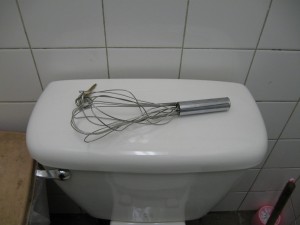 Vandalism in bathrooms in convenience stores has always been a problem. It’s why on road trips you’re almost always met with a bathroom key attached to a strange object like a wooden spoon or in this case… a whisk. If you’re like me, all you do is imagine the years of germs that have accumulated onto the item and promptly decide you can wait until you get to your destination to use the restroom, even if it is still 14 hours away.
Vandalism in bathrooms in convenience stores has always been a problem. It’s why on road trips you’re almost always met with a bathroom key attached to a strange object like a wooden spoon or in this case… a whisk. If you’re like me, all you do is imagine the years of germs that have accumulated onto the item and promptly decide you can wait until you get to your destination to use the restroom, even if it is still 14 hours away.
We have good news though.
There are better options available: Physical keys, buzzers, and code locks.
ADA Code: First Things First
ADA Code factors into almost everything in the door and lock industry and your bathroom locks are no exception. You don’t want to unknowingly violate an ADA code and receive a fine so this should always be your first move.
- Say No to Knobs – Knobs are generally frowned upon in the world of ADA codes when it comes to bathroom doors. In fact, the 2003 edition of Accessible and Usable Buildings and Facilities banned the use of them. However, in the 2010 ADA Standards for Accessible Design, door knobs aren’t necessarily banned, but they’re still frowned upon. To save yourself a headache, choose a lever set.
- Avoid Deadbolts – You should stay away from deadbolts if at all possible. The 2003 Accessible and Usable Buildings code bans anything that requires “tight grasping, pinching and turning of the wrist to operate.” The 2010 ADA Standards for Accessible Design doesn’t explicitly ban the use of them, but for the sake of your wallet, it’s typically better to stay away.
Physical Keys
While there are better (and less germy) options available, the key remains king in the convenience store world of restricted access. This is due to their simplicity and low maintenance. If it gets lost, a replacement can be made quickly and for very little cash.
This doesn’t mean they don’t have their issues.
There’s a reason convenience store keys are attached to large objects. Keys can become lost or stolen easily and while a replacement might not cost that much, it doesn’t mean it’s not an inconvenience.
Buzzers
Many convenience store clerks have to keep their station manned at all time. This makes it difficult to unlock the restroom door for customers when needed. This is when a physical key just won’t work.
Buzzers are perfect options for convenience stores in these situations. They allow the store clerk to stay at their station and press a button that unlocks the door. It needs to be noted that these usually need additional deadbolts so no one can unlock the door while the restroom is occupied. An ADA compliant indicator deadbolt would work though and they typically only run around $50.
Code Locks
Code locks are another option to reduce bathroom vandalism. Keypad codes can be changed should they ever fall into the wrong hands, and they’re easy to give out when customers need access to the restrooms.
However, it’s important to note that changing a code locks isn’t always easy. This depends on which of the code locks you’ve chosen and some even require a technician to change the code.
Batteries are used to power the keypads and these need to be changed regularly. This ensures you aren’t stuck with a dying keypad, code locks that don’t work, and a customer who really has to go.
Do you own a convenience store and are looking for better access control options for your bathroom? Give us a call. Let us help!
